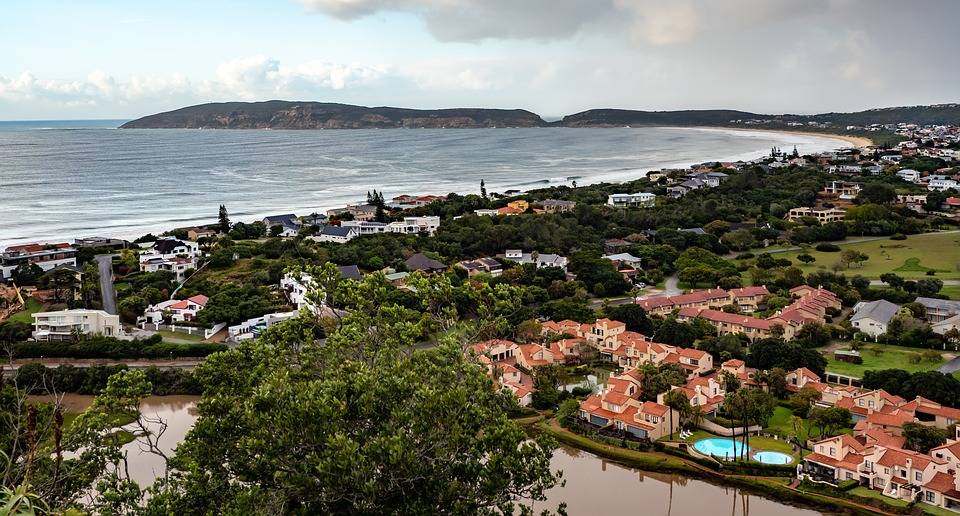Greetings and welcome to another edition of The Shape of The Cape with your host Julescape. Today I bring you the “creme de la creme”, the number 1 top pick of the entire Garden Route, the very best travel destination of them all. It’s called Plettenberg Bay and of all the beautiful seaside destinations along the south Cape coast of Africa, this is, in my opinion, the best.
When the Portuguese sailors rounded the south Cape coast of Africa, before the Dutch or British sailors, back in the 15th century, they found this bay and called it Bahia Formosa – the beautiful bay. And since then this has remained the most beautiful bay of them all. Today simply called Plett by the locals, the bay is still backed in the distance by the Tsitsikamma Mountain range, the highest point being Formosa Peak. The peak itself even gets a dusting of snow almost every year in winter for a day or two. You can imagine the epic sight, only visible for a few hours a year, of standing on the pristine white vast expanse of empty beach on a bright and hot sunny winters day, while simultaneously admiring the snow on the peak in the distance. It really brings the entire world together in one place, or so it seems.
And these beaches are the province of many a wealthy and hard working millionaire for a few weeks in summer, while during the rest of the year they remain pretty much empty and open to anyone who has the insight and ability to attain their treasured shores. That’s why I’m here, and I recommend it to you all. I am a connoisseur of fine beaches, having been born and raised at the beach in Cape Town, about 550km to the west, but even my high standards have been met and all the boxes ticked for a prime beach destination.
These beaches are known as “blue flag” which means that they have life guards on duty over the peak tourist season, and they are hot surf spots for the entire world. Actually one of the world class surf competitions is held annually just an hour away by car to the east, in Jeffrey’s Bay (aka J Bay), known for the best right hand wave in the world, but surfers also frequent these Plett beaches for some slick waves too bro.
It’s amazing to see how empty the town becomes over the majority of the year, and even the houses are empty because about half of them are holiday houses or second homes of the super rich. And even they can’t afford to live here all year long but have to work in the big city somewhere to afford a few weeks of life in paradise. Well, why not just move to paradise? I certainly have. And I own almost nothing. This idea of ownership of land or possessions is foreign to the indigenous Koi San bushmen tribes who were the real indigenous inhabitants of this Cape coast thousands and even just hundreds of years ago.
When the Dutch arrived in 1652, they met the Koi San bushmen in the Cape and traded or bartered for cattle with them, but the bushmen had never imagined the concept of private ownership of this vast open land they they would migrate through with their herds of cattle. This entire coast was their native home. How times have changed with the advent of European capitalism and “civilization”. Anyway, I identify with the ancestral “strandloper” (beach walker) as the bushmen were called, and own no land and few possessions while living as a constant traveller in paradise, at present all along this Cape south coast of Africa.
In fact this very shoreline is known in the Guinness Book of Records as the second most temperate area on the entire planet, second only to Hawaii. So beat that guys! That’s why I’m revealing these treasures to you too. They do exist and await you if you wish to take shelter from the harsh reality of the Northern Hemisphere. The whales certainly do. Annually in winter, around August – November, they come here to this very bay, among others along the south Cape coast of Africa, to give birth to their young.
Tragically it was the whales that led hunters to set up a whaling station here over a century ago, since the whale oil and flesh was used for lighting and other purposes. Tens of thousands were killed but that is now banned and the whaling station is nowhere to be seen. Only one or two countries with a whaling history are stuck in the dark ages and still dare to hunt and kill whales, like the Japanese and perhaps some Scandinavians. These are the biggest creatures on the planet by far, with warm blood and big brains. They are to be respected and treated humanely by the human who is a caretaker or custodian of the weaker species. Well, you can come and observe the whales for yourself in winter here, so plan your trip guys. The beautiful bay awaits you.
